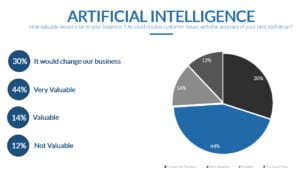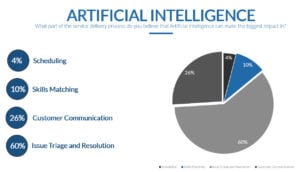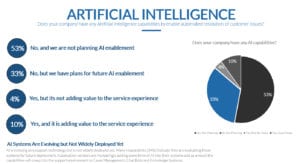Harnessing the Power of AI in the Services Sector
Artificial Intelligence (AI) is a revolutionary technology that promises significant enhancements in service efficiency, cost reduction, and product quality within the Services Sector. While the potential of AI is immense, its widespread deployment is still in the nascent stages. A recent benchmark study conducted by our team at Service Strategies sought to gain insights from executives about their current use of AI, its anticipated impact on their business, and the areas where AI could wield the most influence in the future.
Unleashing AI’s Potential
The study unveiled that while a majority of service executives acknowledge the potential benefits of AI, very few are actively harnessing this technology in their operations. Approximately 30% of respondents anticipate AI to bring about substantial changes in their business. The prospect of AI automating issue resolution with high precision was identified as a key factor in augmenting the efficiency and cost-effectiveness of service delivery.

Fig. 1 – Potential Impact of AI on Your Business
Balancing Technology and Relationships
While the benefits of artificial intelligence in service delivery are undeniable, some executives voiced concerns about potentially losing the personal touch and robust customer relationships that service professionals foster over time. These relationships often play a pivotal role in fostering customer loyalty and retention. As AI becomes more pervasive, it will be crucial for service professionals to shift their focus towards relationship building and offer additional layers of value beyond technical skills. This calls for a redefinition of the service professional’s role and enhancement of their soft skills.
Areas of Maximum Impact
The majority of executives agreed that issue triage and resolution are the areas where AI could have the greatest impact. Automating customer communications and skills matching to ensure appropriate resource allocation were also highlighted as important areas for AI implementation. Moreover, the deployment of IoT technology, which enables enhanced remote monitoring and automatic troubleshooting, was identified as a critical factor in leveraging AI for service delivery, as it provides valuable data streams for AI systems to analyze.

Fig 2 – Where AI can Have Biggest Impact
Current Adoption and Future Outlook
Despite the growing buzz around AI, the study found that a significant portion of executives (53%) had no plans for implementing AI in their organizations. Another 33% acknowledged the need for AI but had not yet taken steps to implement it. Only 10% reported having some form of AI in place that added value to the service experience. As automation vendors continue to integrate AI capabilities into their systems, service organizations will need to consider how quickly they adopt these new technologies.

Fig 3 – Current Use of AI
Conclusion
Artificial intelligence is undeniably infiltrating the Services Sector, but we have yet to realize its full potential. Therefore, service executives need to plan proactively for the future and ensure they maintain strong customer relationships in the face of increasing automation. Leveraging AI and IoT technologies can drive improvements in service efficiency, cost-effectiveness, and customer satisfaction. As we navigate this era of AI in services, it’s crucial for organizations to embrace the possibilities and adapt their service strategies accordingly.
Social Media
FacebookTwitterGoogle +YoutubeLinkedin